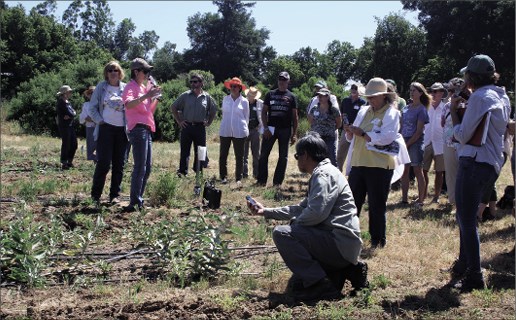June 28, 2019 - By Christine Souza - With the Western monarch butterfly population dropping, conservation groups encourage farmers, ranchers and home gardeners to plant more of the native milkweed that monarchs need to survive—and are working on seed mixes and other incentives to speed the rescue effort.


At a Monarch Conservation Field Day in Lockeford, Natural Resources Conservation Service Plant Materials Center agronomist Valerie Bullard, center with microphone, speaks about an ongoing milkweed field trial. Photo/Christine Souza
To discuss conservation strategies, research, programs and outreach to boost planting of monarch habitat in California, people gathered in Lockeford last week for a Monarch Conservation Field Day. The event, held during National Pollinator Week, was sponsored jointly by the Xerces Society and the U.S. Department of Agriculture at the USDA Natural Resources Conservation Service Plant Materials Center.
"Monarch caterpillars feed on milkweed as their host plant; that is the only plant they eat as caterpillars and they cannot develop into adults without milkweed," said Angela Laws, monarch and pollinator ecologist for the Xerces Society, a nonprofit that has been working with the Western monarch for more than 20 years. "Milkweed is found throughout the West. In the U.S. there's about 72 species of milkweed; there are 15 species in California."
In 2018, she said, a Xerces count revealed that the Western monarch butterfly population overwintering in California dropped to 28,429, the lowest level ever recorded and an 85% drop from the previous year.
"We have this perfect storm of issues," Laws said, citing the loss of milkweed as a significant factor for the monarch's decline, in addition to other factors such as "loss of habitat of overwintering sites, loss of habitat in breeding sites, insecticides, climate change, pesticides and diseases."
Many farmers and ranchers already work with NRCS, the Xerces Society and others to plant native milkweed and nectar plant varieties, but presenters at the field day described a challenge to increased plantings: lack of access to milkweed seed.
In collaboration with partners such as the NRCS Plant Materials Program and Hedgerow Farms in Winters, Xerces said it is producing new sources of milkweed in areas of the monarch's breeding range in California and other states.
At the field day, attendees viewed a milkweed trial planted in 2017 as a collaboration among the Xerces Society, NRCS Plant Materials Center and Hedgerow Farms.
Xerces Society senior pollinator conservation specialist Jessa Kay Cruz pointed to a trial of three species—showy milkweed, narrow-leafed milkweed and woolly-pod milkweed—and noted the planting continues trials started by Hedgerow Farms.
"We set the trials up to look at different ways of establishing milkweed," Cruz said. "We felt it was important because people were really struggling with getting milkweed established. Germination rates seemed low and they were getting outcompeted by weeds, so we just weren't having a huge amount of success."
Patrick Reynolds, general manager of Hedgerow Farms, which grows 350 acres of habitat materials, said early collaborations to produce milkweed seed resulted in much trial and error and "very low production at a very high cost."
"We did an informal trial where we dug up milkweed and essentially separated them (rhizomes, or underground stems, into cuttings) and we found that they did really well," Reynolds said. "With larger rhizomes, we got 87% survival. We're pretty confident that rhizomes are a pretty good way to establish milkweed."
He said Hedgerow Farms is now working with the Xerces Society on developing monarch kits that include 200 transplants of four nectar species and one species of milkweed. In addition, ranchers who would prefer to plant only nectar-plant species as opposed to milkweed, which can be poisonous to livestock, have that option.
Target areas for establishing monarch habitat include the Central Valley, coastal ranges and foothills. Monarch plant kits will be ready this October.
"Initially, most of these kits will go out to working lands, to try to get habitat areas established on farms. We're going to produce the material, Xerces is going to provide it and then landowners will pick it up," Reynolds said.
NRCS State Biologist Tom Moore said farmers and ranchers can use the agency's farm-bill-funded conservation programs, such as the Environmental Quality Incentives Program, to implement practices to help monarchs and other pollinators, and benefit their agricultural operations.
"All of California is not optimal habitat for the monarch butterfly. We want to prioritize where they are still existing and branch out from that; we want to know which type of milkweed works best in different areas," Moore said. "We're working with Xerces, Hedgerow and other nurseries and universities to come up with some good seed mixes that will work. These field trials have been very informative to us."
The U.S. Fish and Wildlife Service has been considering whether to protect the monarch butterfly under the Endangered Species Act. A deadline to determine whether the species warrants federal protection has been extended to Dec. 15, 2020.
To request a list of milkweed and nectar plants that benefit the Western monarch butterfly, email centralvalleypollinators@xerces.org.
(Christine Souza is an assistant editor of Ag Alert. She may be contacted at csouza@cfbf.com.)
Reprinted with permission: California Farm Bureau Federation








